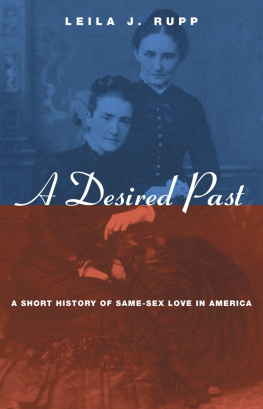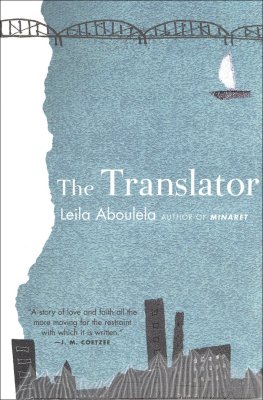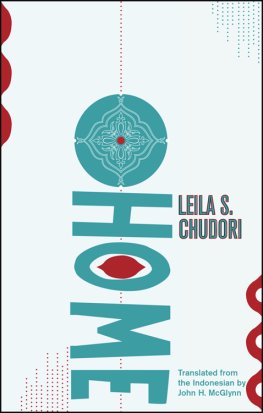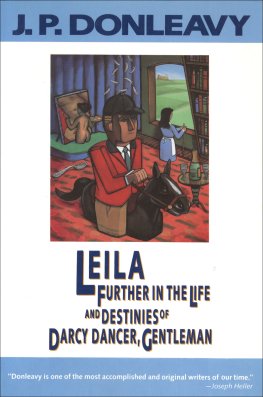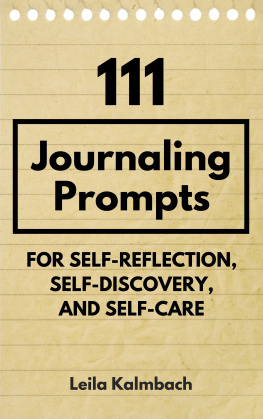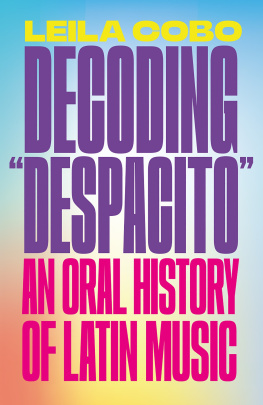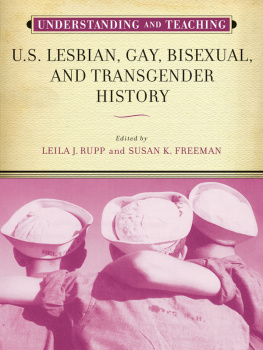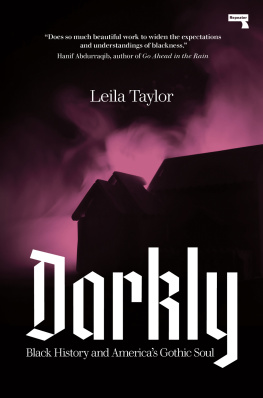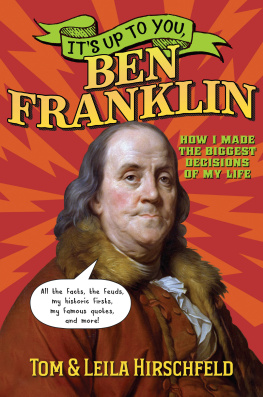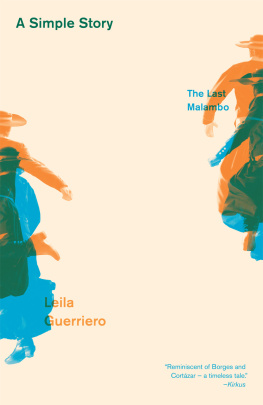The University of Chicago Press, Chicago 60637
The University of Chicago Press, Ltd., London
1999 by The University of Chicago
All rights reserved. Published 1999
Paperback edition 2002
19 18 17 16 15 14 13 12 11 10 5 6 7 8 9 10
ISBN-13: 978-0-226-73155-1 (cloth)
ISBN-13: 978-0-226-73156-8 (paper)
ISBN-10: 0-226-73155-3 (cloth)
ISBN-10: 0-226-73156-1 (paper)
ISBN-13: 978-0-226-77533-3 (ebook)
Library of Congress Cataloging-in-Publication Data
Rupp, Leila J., 1950
A desired past : a short history of same-sex love in America / Leila J. Rupp.
p. cm.
Includes bibliographical references.
ISBN 0-226-73155-3 (cloth : alk. paper).
1. GaysUnited StatesHistory. 2. HomosexualityUnited StatesHistory. I. Title.
HQ76.3.U5R86 1999
306.76'6'0973dc21
98-56542
CIP

The paper used in this publication meets the minimum requirements of the American National Standard for Information SciencesPermanence of Paper for Printed Library Materials, ANSI Z39.48-1992.
Preface
Every day, as part of my morning routine, I wind the German china clock that my grandfather gave my grandmother in 1902 to celebrate the birth of their first (and as it turned out, only) daughter, Leila. When Leila died in 1991, my father (her brother) inherited the clock. It chimed as my father cared for my mother in her last days, and when my father died two years later, my brother and sister simply assumed the clock would be mine. Each morning while winding the clock, I have thought about this book, since it begins with Aunt Leila.
The truth is that I don't know whether I would have had the courage to put all this in print had I known that Aunt Leila, my mother, and my father would read it. Yet I did tell my parents about the project, and I did write some of it literally at my father's bedside as he lay dying. When he fell asleep, I would pull out my books and laptop and try to distract myself. He would have understood, for he too experienced writing as joy and solace, and somehow he passed this gift along to me. As always, I need to acknowledge the enormous debt I owe my family for surrounding me with love, support, intellectual stimulation, and a passion for the past.
Without really knowing it, Marty Duberman inspired me to begin this project. Several years ago he asked me to contribute to the young adult series launched by Chelsea House. I was deeply immersed in my work on the international women's movement and didn't really want to put it aside, yet I was also enormously attracted to the challenge of synthesizing the history of same-sex sexuality for a general audience. The series went down the drain, though, when right-wing agitation caused libraries to cancel orders for any books published by Chelsea House. But in the end I got to have my cake and eat it too. I finished one book and started the other, and voil, A Desired Past took shape.
I am greatly indebted to those from my present and pastsome here only in spiritfor many of the personal stories I share in this book. I especially thank Leila, Diantha, Sidney, Walter, Margaret, John, Verta, Pippa, Carla, Cody, Lily, Steve, Donna, Joan, Phyllis, Kelly, Alice, Sushi, Milla, Scabola, Inga, Margo, Kylie, R. V., and of course Emma.
Needless to say, I couldn't have written this book without the brilliant and courageous work of so many historians who have excavated past lives and crafted the tales that make this synthesis possible. The notes and reference list track their contributions, but I feel the need to say an even bigger thank-you to all of them, and to mention especially Jonathan Katz, whose documentary histories have proved priceless; John D'Emilio and Estelle Freedman, whose Intimate Matters lighted the way; and several others whose research plays an especially important role here: Robert Baum, Brett Beemyn, Allan Brub, Rudi Bleys, Nan Boyd, Kathleen Brown, Vern and Bonnie Bullough, George Chauncey, Blanche Cook, Madeline Davis, Allen Drexel, Marty Duberman, Lisa Duggan, Lillian Faderman, Trisha Franzen, Eric Garber, Richard Godbeer, Karen Hansen, Helen Horowitz, John Howard, David Johnson, Liz Kennedy, Elizabeth Knowlton, the late Marty Levine, Leisa Meyer, Joan Nestle, Esther Newton, Mary Beth Norton, Annelise Orleck, Michael Quinn, Tim Retzloff, David Reynolds, Anthony Rotundo, Charles Shively, Carroll Smith-Rosenberg, Marc Stein, Roey Thorpe, Richard Trexler, Sharon Ullman, Walter Williams, and Judy Wu. I am also grateful to those scholarsAlex Cofield, Susan Freeman, Lyn Hegarty, David Johnson, Liz Kennedy, Heather Miller, Barbara Mourn, John Weiss, and Judy Wuwho sent or lent me unpublished material and generously allowed me to quote from it.
John D'Emilio, Nancy Guzowski, Pippa Holloway, Joan Huber, Betsy Kaminski, Joanne Meyerowitz, Carla Pestana, Birgitte Sland, Marc Stein, and Verta Taylor read the entire manuscript and contributed all sorts of assistance, much of it way beyond the call of duty: moral support, encouragement, enthusiasm, expert advice, suggestions for specific revisions, and astute and thorough criticism. Heather Miller provided valuable research assistance and held my hand through the trauma of switching to a new computer program. I thank the many individuals at libraries and archives who supplied photographs and gave me permission to reprint them here. In particular, Karolina Garrett of the Northern California Gay and Lesbian Historical Society and Morgan Gwenwald of the Lesbian Herstory Archives went out of their way to help. When I could not find all the photographs I needed, Jack, Mark, and Tim stepped in. Alice Bennett's expert and inspired copyediting improved my prose immeasurably. And finally, Doug Mitchell encouraged me, took a chance on a project outside what the University of Chicago Press usually publishes, and entertained me with lively e-mail messages and his famous taste for good restaurants.
John Lennon and Paul McCartney's In My Life, with its wistful remembering of places and lovers and friends, captures what I feel about the personal past I have put into this book. And it also furnishes the best line for Verta: There's no one compares with you.
 The paper used in this publication meets the minimum requirements of the American National Standard for Information SciencesPermanence of Paper for Printed Library Materials, ANSI Z39.48-1992.
The paper used in this publication meets the minimum requirements of the American National Standard for Information SciencesPermanence of Paper for Printed Library Materials, ANSI Z39.48-1992.

